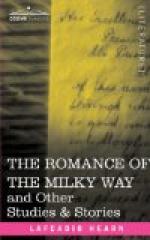In his first days as a writer Hearn had conceived an ideal of his art as specific as it was ambitious. Early in the eighties he wrote from New Orleans in an unpublished letter to the Rev. Wayland D. Ball of Washington: “The lovers of antique loveliness are proving to me the future possibilities of a long cherished dream,—the English realization of a Latin style, modeled upon foreign masters, and rendered even more forcible by that element of strength which is the characteristic of Northern tongues. This no man can hope to accomplish, but even a translator may carry his stones to the master-masons of a new architecture of language.” In the realization of his ideal Hearn took unremitting pains. He gave a minute and analytical study to the writings of such masters of style as Flaubert and Gautier, and he chose his miscellaneous reading with a peculiar care. He wrote again to the same friend: “I never read a book which does not powerfully impress the imagination; but whatever contains novel, curious, potent imagery I always read, no matter what the subject. When the soil of fancy is really well enriched with innumerable fallen leaves, the flowers of language grow spontaneously.” Finally, to the hard study of technique, to vast but judicious reading, he added a long, creative brooding time. To a Japanese friend, Nobushige Amenomori, he wrote in a passage which contains by implication a deep theory not only of literary composition, but of all art:—
“Now with regard to your own sketch or story. If you are quite dissatisfied with it, I think this is probably due not to what you suppose,—imperfection of expression,—but rather to the fact that some latent thought or emotion has not yet defined itself in your mind with sufficient sharpness. You feel something and have not been able to express the feeling—only because you do not yet quite know what it is. We feel without understanding feeling; and our most powerful emotions are the most undefinable. This must be so, because they are inherited accumulations of feeling, and the multiplicity of them—superimposed one over another—blurs them, and makes them dim, even though enormously increasing their strength.... Unconscious brain work is the best to develop such latent feeling or thought. By quietly writing the thing over and over again, I find that the emotion or idea often develops itself in the process,—unconsciously. Again, it is often worth while to try to analyze the feeling that remains dim. The effort of trying to understand exactly what it is that moves us sometimes proves successful.... If you have any feeling—no matter what—strongly latent in the mind (even only a haunting sadness or a mysterious joy), you may be sure that it is expressible. Some feelings are, of course, very difficult to develop. I shall show you one of these days, when we see each other, a page that I worked at for months before the idea came clearly.... When the best result comes, it ought to surprise you, for our best work is out of the Unconscious.”




